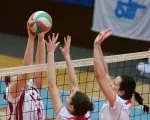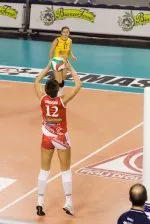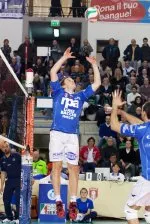LESSON 10:
My Top 7 Exercises for Volleyball
#1 Hip Thrust with External Load
Most people think they have strong glutes, but they
don't. They believe this because they think that squats, deadlifts, and
lunges are the best glute exercises, and they've spent years getting
very strong at these.
The fact is, squatting, deadlifting, and lunging don't strengthen the
glutes that much. Most traditional exercises for volleyball like these target the quads
and erector spinae. Even box squatting and walking lunges don't
activate the glutes much in comparison to hip thrusts.


#2 Physioball Leg Curls with External Load
During physioball leg curls, the hips
are activated much like they are when making athletic forward movements
such as sprinting or jumping.
Compare the following movements...
Do you see how the movement of the physioball leg curl and volleyball approach are similar?
The hips are powered forward (the top arrow), the planted foot is
pulling back (bottom right arrow), and the ground reaction forces are
pulling forward (bottom left arrow).
Also, the glutes are trained to fire first which is important when
considering the importance of firing the right muscles at the right
time.
This physioball leg curl is performed by first starting in glute bridge
position by lifting your hips up off the ground. Then, while keeping
your hips and core activated, roll the ball towards you by using your
hamstrings and keeping your glute muscles activated. Each repetition is
performed by rolling the ball to 90 degree knee flexion and then back to
glute bridge start position.


#3 Front Squats
I prefer to use the front squat
rather than the back squat for a couple reasons. There are two
potentially dangerous forces in squatting, torque and compression. Both
are present in higher degrees in the back squat than the front squat.
Also, front squats will always be done with lighter loads. Heavier
weights cause greater compressive loads on the spine and back squats
produce a torque that is potentially dangerous to the SI joint.
The truth is that front squats decrease spinal load and improve back position.

#4 Kettlebell Swings
A key benefit of kettlebell swings is
that they train all parts of the back from the lower back all the way
to traps. They train all the muscles together giving you a great
functional workout.
Swings develop the important posterior chain muscles of the body such as the hamstrings, glutes, core and back.
These muscles are often overlooked with traditional strength training
and are crucial for strength and power sports such as volleyball.


#5 Hip Circuits
Glute activation is a very important concept and necessary for getting your glutes firing properly.
Believe it or not, most individual's glutes contract harder during
bodyweight glute activation exercises than from one-rep max squats and
deadlifts.
I like to perform the hip circuit at the beginning of my workouts. This exercise will also help to improve hip mobility.


Glute bridges and X-band walks are also great for firing the glutes.
#6 Spiderman Pushups
This is just like a regular push except there's more core activation to help stabilize and balance. Start out in push up position. As you lower down, float one leg off the ground bending to 90 degrees. Keep your hips off the floor. Complete the push up going back to start position and repeat the movement with the opposite leg.

Volleyball Core Training
#7 Renegade Rows
Renegade rows force you to use the primary function of the stomach muscles stabilization.
Dont twist the hips. Most of the videos you will see on the web show
people performing exercise for volleyball incorrectly. Twisting the body or hips
makes the exercise easy and ineffective. Avoid this mistake and keep the
body parallel to the ground!
Row the weight using your back. When doing a rowing motion, always rely
primarily on your back muscles (try contracting your armpit muscles) and
NOT your biceps. Try leading with your elbow as if your arm was just a
hook to which the weight is attached.



If you enjoyed these tips and would like to keep it close to you at any time, just save this pin to your Pinterest Volleyball Training Board.
Volleyball › Coaching Lessons › Top 7 Exercises for Volleyball
ACCESS MY STRENGTH SECRETS








